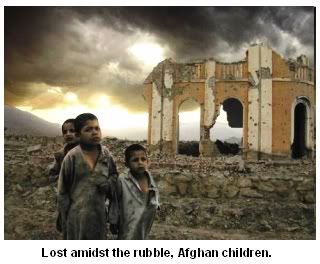Michael Collins
It is easy to forget that when this war began, we were united ├ éČ" bound together by the fresh memory of a horrific attack, and by the determination to defend our homeland and the values we hold dear. I refuse to accept the notion that we cannot summon that unity again. President Barack Obama, December 1
President Obama made this appeal for unified support of his Afghanistan policy at the very end of his speech at West Point last night. It seems awkwardly placed at the conclusion of a long and fairly cerebral oration. After reviewing the arguments for his policy, the placement may make some sense.
The president began by saying he was going to discuss ├ éČ┼"the nature of our commitment there, the scope of our interests, and the strategy that my Administration will pursue to bring this war to a successful conclusion.├ éČ Ł
The pertinent history on our commitment, according to the president, began with the attack on 9/11 2001. He told us that "ruthless, repressive and radical movement that seized control of that country after it was ravaged by years of Soviet occupation and civil war, and after the attention of America and our friends had turned elsewhere." That regime served as the incubator for al Qaeda's planning and execution of the attacks on New York City and the capitol.
Obama outlined the nearly unanimous votes in both houses of Congress to authorize the war; an authorization that he reminded us is still in effect. He moved from authorization to our quick military victory. Those efforts gave "A place that had known decades of fear now had reason to hope." How? In concert with the United Nations, the United States created a government headed by Humid Karzai, who remains the president of Afghanistan today.
Obama's narrative shifted from the initial rationale and success of the Afghanistan invasion to the reasons for action today. The Iraq War distracted from the efforts in Afghanistan and disrupted our unified post 9/11 relationships with the international community. He mentioned 160,000 troops in Iraq and 30,000 in Afghanistan to illustrate the skewed priorities but claimed that some progress in Afghanistan had been made.
Obama then hit on the rationale for continued efforts in Afghanistan and his surge of troops. "The review is now complete," he said. The president decided that al Qaeda poses an ongoing threat to the United States and that to meet that threat; three goals had to be met.
What is the nature of the threat?
"This (Afghanistan) is the epicenter of the violent extremism practiced by al Qaeda. It is from here that we were attacked on 9/11, and it is from here that new attacks are being plotted as I speak. This is no idle danger; no hypothetical threat. In the last few months alone, we have apprehended extremists within our borders who were sent here from the border region of Afghanistan and Pakistan to commit new acts of terror."
To reduce this threat requires three accomplishments. Over the next 18 months, the United States will "break the Taliban's momentum" and increase Afghanistan's capacity." With increased security, U.S., NATO, and United Nations efforts will be more effective in implementing an "effective civilian strategy." Finally, "we will act with the full recognition that our success in Afghanistan is inextricably linked to our partnership with Pakistan." We were told that accomplishing these objectives will achieve the security of preventing any more incursions by al Qaeda "within our borders."
President Obama failed to mention any of the threatened "new acts of terror." He also failed to mention bin Laden.
The president then considered and dismissed three anticipated objections to his policies and delivered his peroration at the beginning of this article.
Comment
President Obama is a gifted orator. However, in this case, he was long on style but lacking in substance. He started out with a history lesson concerning U.S. involvement with Afghanistan but he left out the most interesting parts.
(Note: You can view every article as one long page if you sign up as an Advocate Member, or higher).





